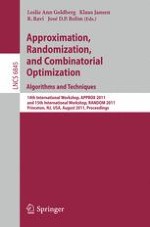2011 | OriginalPaper | Buchkapitel
Limits on the Rate of Locally Testable Affine-Invariant Codes
verfasst von : Eli Ben-Sasson, Madhu Sudan
Erschienen in: Approximation, Randomization, and Combinatorial Optimization. Algorithms and Techniques
Verlag: Springer Berlin Heidelberg
Aktivieren Sie unsere intelligente Suche, um passende Fachinhalte oder Patente zu finden.
Wählen Sie Textabschnitte aus um mit Künstlicher Intelligenz passenden Patente zu finden. powered by
Markieren Sie Textabschnitte, um KI-gestützt weitere passende Inhalte zu finden. powered by
Despite its many applications, to program checking, probabilistically checkable proofs, locally testable and locally decodable codes, and cryptography, “algebraic property testing” is not well-understood. A significant obstacle to a better understanding, was a lack of a concrete definition that abstracted known testable algebraic properties and reflected their testability. This obstacle was removed by [Kaufman and Sudan, STOC 2008] who considered (linear) “affine-invariant properties”, i.e., properties that are closed under summation, and under affine transformations of the domain. Kaufman and Sudan showed that these two features (linearity of the property and its affine-invariance) play a central role in the testability of many known algebraic properties. However their work does not give a complete characterization of the testability of affine-invariant properties, and several technical obstacles need to be overcome to obtain such a characterization. Indeed, their work left open the tantalizing possibility that locally testable codes of rate dramatically better than that of the family of Reed-Muller codes (the most popular form of locally testable codes, which also happen to be affine-invariant) could be found by systematically exploring the space of affine-invariant properties.
In this work we rule out this possibility and show that general (linear) affine-invariant properties are contained in Reed-Muller codes that are testable with a slightly larger query complexity. A central impediment to proving such results was the limited understanding of the structural restrictions on affine-invariant properties imposed by the existence of local tests. We manage to overcome this limitation and present a clean restriction satisfied by affine-invariant properties that exhibit local tests. We do so by relating the problem to that of studying the set of solutions of a certain nice class of (uniform, homogenous, diagonal) systems of multivariate polynomial equations. Our main technical result completely characterizes (combinatorially) the set of zeroes, or algebraic set, of such systems.
